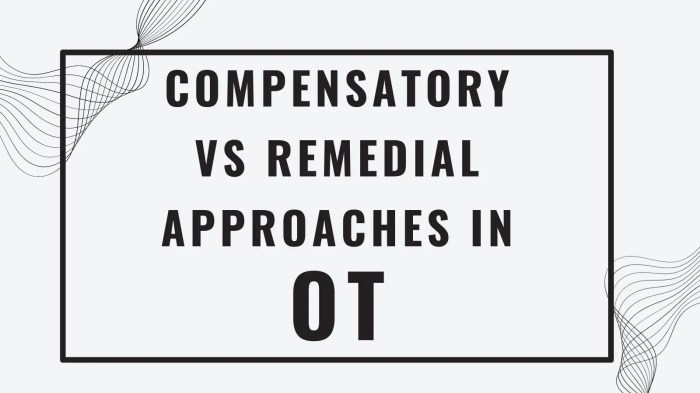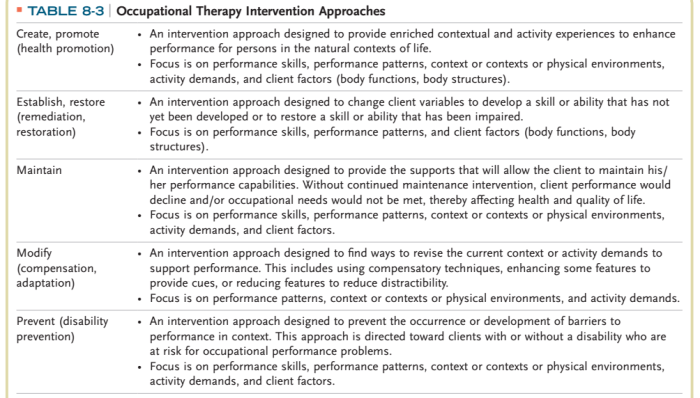The remedial approach in occupational therapy stands as a cornerstone in rehabilitative practice, aiming to restore and enhance individuals’ functional abilities and participation in meaningful activities. By delving into its methods, assessment techniques, and evidence-based practices, this discussion unravels the intricacies of this therapeutic approach, showcasing its transformative impact on individuals’ lives.
Through individualized treatment plans, a remedial approach in occupational therapy empowers individuals to regain lost skills, develop compensatory strategies, and maximize their potential for independence and well-being.
Introduction: Remedial Approach In Occupational Therapy

A remedial approach in occupational therapy is a specialized intervention designed to address specific functional deficits or limitations in individuals. It focuses on improving or restoring the skills and abilities necessary for meaningful participation in everyday activities and roles.
The primary goal of a remedial approach is to enhance the individual’s functional independence and participation by addressing underlying impairments that hinder their performance in occupational tasks. This approach aims to improve the individual’s ability to engage in meaningful activities that are essential for daily living, work, and leisure.
Methods and Techniques
A remedial approach in occupational therapy employs various methods and techniques to achieve its goals. These techniques are tailored to the specific needs and impairments of the individual.
- Task-oriented training:This involves breaking down complex tasks into smaller, manageable steps and practicing them repeatedly to improve performance.
- Compensatory techniques:These strategies help individuals overcome functional limitations by using alternative methods or tools to complete tasks.
- Sensory integration techniques:These activities aim to improve sensory processing and integration, which can enhance functional abilities.
- Neuromuscular re-education:This focuses on improving muscle strength, coordination, and range of motion through targeted exercises.
- Cognitive rehabilitation:This approach targets cognitive impairments that affect functional abilities, such as attention, memory, and problem-solving.
Assessment and Evaluation, Remedial approach in occupational therapy
A comprehensive assessment and evaluation process is crucial to determine the need for a remedial approach and to develop an individualized treatment plan.
Assessments may include:
- Occupational history and interview:Gathering information about the individual’s daily routines, occupations, and challenges.
- Performance-based assessments:Evaluating the individual’s abilities to perform specific tasks and identify areas of difficulty.
- Standardized assessments:Using standardized tests to assess specific cognitive, sensory, or motor skills.
Ongoing evaluation is essential to monitor progress and adjust treatment plans as needed, ensuring that the intervention remains effective and responsive to the individual’s changing needs.
Benefits and Outcomes
A remedial approach in occupational therapy can lead to significant benefits and positive outcomes for individuals with functional impairments.
- Improved functional independence:Enhanced ability to perform daily tasks, increasing self-reliance and reducing the need for assistance.
- Increased participation in meaningful activities:Greater involvement in work, leisure, and social activities, promoting overall well-being.
- Reduced pain and discomfort:Improved posture, body mechanics, and muscle function can alleviate pain and discomfort associated with functional limitations.
- Enhanced quality of life:Increased functional abilities and participation lead to a better quality of life, with greater satisfaction and fulfillment.
Questions and Answers
What is the primary goal of a remedial approach in occupational therapy?
The primary goal is to restore or enhance functional abilities and participation in meaningful activities.
How are treatment plans developed in a remedial approach?
Treatment plans are individualized based on comprehensive assessments and evaluations to address specific needs and goals.
What role does evidence-based practice play in a remedial approach?
Evidence-based practice guides the selection of interventions and techniques to ensure their effectiveness and maximize outcomes.

